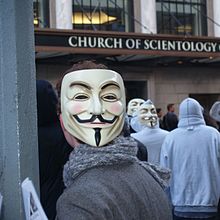Scientology versus the Internet

As Scientology and the Internet anti-Scientology activists designate by Scientology initiated set of measures against their opponents. The anti-Scientology activists accuse Scientology of taking coercive measures with the help of police, lawyers and courts in the USA, Finland, Sweden and the Netherlands.
Scientology has been accused of these measures in various publications in various computer specialist magazines since 1994; The aim of these measures is to prevent the dissemination of "secret" or unpleasant documents written by Church of Scientology founder L. Ron Hubbard , particularly the OT III documents dealing with Xenu .
These approaches include:
- Even with short quotations from Scientology writings, lawsuits for copyright infringement are sometimes threatened. In some cases, such a lawsuit has also been filed.
- Some sites that the word Scientology or eight-pointed Scientology Cross use was having regard to an alleged abuse of trademark ( Trademark threatened) Scientology lawsuits.
- Use of the Digital Millennium Copyright Act (DMCA) to stop unpopular Internet sites: under US law, it is sufficient to claim that a website infringes US copyright law for the (American) provider to delete the site must in order not to be guilty of a copyright infringement. One can only proceed against unjustified claims of copyright infringement through (expensive) lawsuits in the USA. However, using a provider outside of the United States can often work around this problem.
- Distributing an Internet filtering program to followers to prevent viewing of critical pages containing the names of critics and non-Scientology religious material.
- Flooding the Usenet group alt.religion.scientology with nonsensical computer-generated posts to scare off readers.
- Publication of numerous, very similar Internet pages (since 2005 also blogs ) and domains (" link farms ") in order to displace other pages from search engines.
- Publish defamatory disinformation pages opponents.
Scientology lawsuits were also the reason why the world's first Nym remailer ceased operations in 1996 after three and a half years. Internet users had used this service ( anon.penet.fi ) to publish internal Scientology material under a pseudonym in various discussion forums. After Scientology had forced the release of three sender addresses in a Finnish court, the operator of anon.penet.fi , Johan Helsingius, gave up the project.
Web links
- Official statement of Scientology: Church of Scientology's Statement Re: The Church of Scientology and the Internet ( Memento of August 29, 2006 in the Internet Archive )
- Dutch protest against Scientology Chronology and documents of a 10-year trial in the Netherlands between Scientology on the one hand and the Internet provider XS4ALL and the author Karin Spaink on the other
There are many passionately committed participants on both sides in this dispute. Neutral comments are rare in this emotional debate. Here are some of the sites that try to use factual language:
- Scientology archive of the Electronic Frontier Foundation (religiously neutral group for freedom of information on the Internet) EFF Electronic Frontier Foundation "Legal Cases - Church of Scientology" Archive ( Memento from June 9, 2006 in the Internet Archive )
- Michael Peckham: New Dimensions of Social Movement / Countermovement Interaction: The Case of Scientology and its Internet Critics . In: Canadian Journal of Sociology / Cahiers canadiens de sociologie 23, 1998, pp. 317-47.
Individual evidence
- ↑ Scientology: House search on demand ( Memento of May 17, 2008 in the Internet Archive ), intern.de, September 18, 2002
- ↑ Censorship or copyright protection? Scientology on the Internet ( Memento of August 17, 2000 in the Internet Archive ), c't 3/1996
- ↑ Scientology attacks freedom on the Internet ( Memento June 28, 2006 in the Internet Archive ), ECIN, May 20, 1998
- ^ Google censors Scientology critics , heise.de, March 21, 2002
- ↑ Internet - The Scientologists' Vietnam? ( Memento of March 12, 2007 in the Internet Archive ), LfV BaWü, 04/2001
- ↑ Internet archive blocked Scientology critics , heise.de, September 25, 2002
- ↑ Scientology vs. Internet ( Memento of September 27, 2007 in the Internet Archive ), data slingshot No. 51
- ↑ The Internet - a legal vacuum? , JurPC, 16/1997
- ↑ Scientology puts pressure on Google ( memento of March 13, 2007 in the Internet Archive ), PC-Welt , March 22, 2002
- ↑ Michael Brunnbauer: Closure of the anonymous remailer anon.penet.fi . FITUG , 1996
- ↑ Detlef Borchers: Attack of the Nameless . In: Die Zeit 37/1997